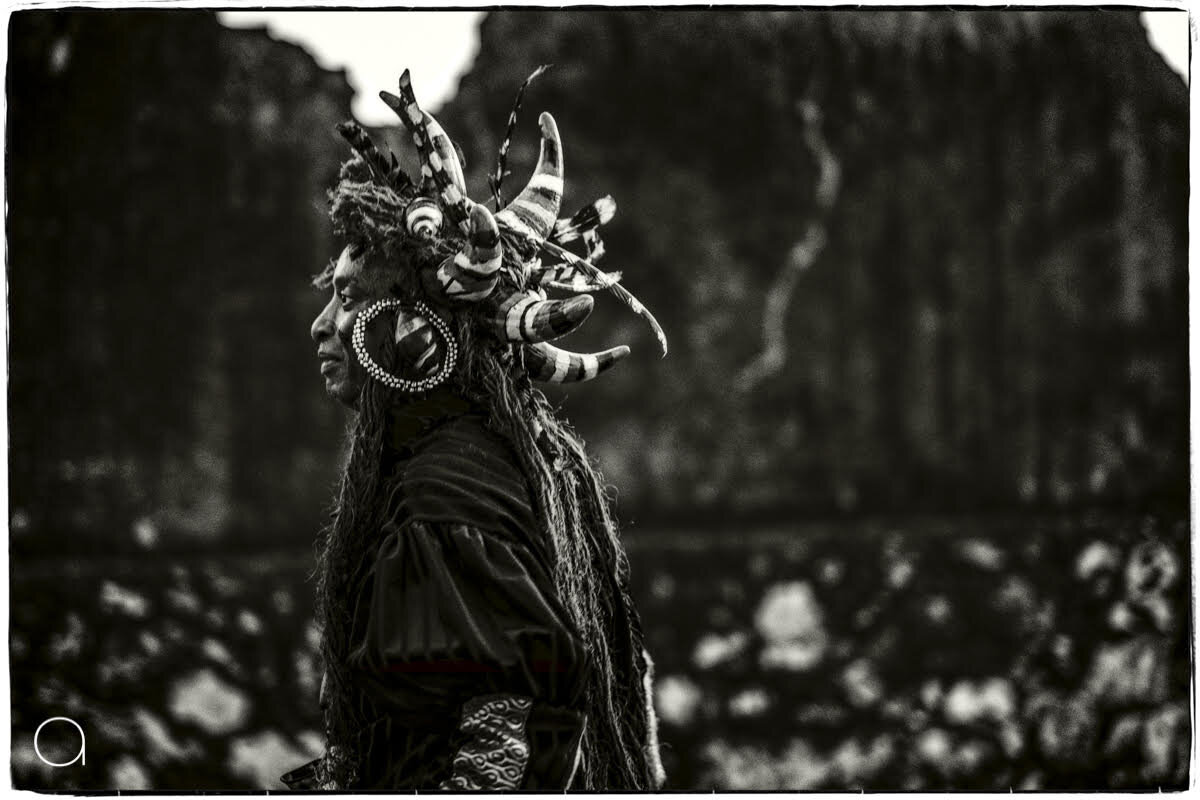The Dark Laboratory Presents
I’m New Here:
Black and Indigenous Ecologies
The Warriors of huracÁn
By Abigail Hadeed
Biography
Abigail Hadeed is a Trinidadian photographer and producer who has been documenting the Caribbean and the Americas for the past 30 years. She is synonymous with her black and white photographs of steelbands, traditional carnival, theatre, Caribbean descendants in Central America (Trees Without Roots, published in 2006), and the indigenous people of Guyana’s Rupununi savannah (Commonwealth Photographic Awards winner, 2006). Hadeed’s archives owe much to her ability to discover people and places at the crossroads of an unresolved past and an impending future, torn between pain and possibility, disquiet and hope. Her deeply felt images are the fusing of eye and instinct, a stalking through shadow and light of what can only be glimpsed.
In November 2018 Hadeed’s unpeopled and introspective The Weight of Water, an exhibit a decade in the making, opened in Port of Spain, Trinidad. A meditation on nature and alienation – pollution, consumption, and the link between environmental and spiritual degradation – it coursed through Trinidad’s waters to as far north as the Bahamas archipelago. Hadeed’s work has been featured at the Americas Society (New York), Biennials in São Paulo, Brazil 1998, and Havana, Cuba 2006, in Pictures from Paradise: A Survey of Contemporary Caribbean Photography at the Scotiabank CONTACT Photography Festival in Toronto, Canada, and is also part of the permanent collection of Light Work, Syracuse, NY, USA.
The Warriors of Huracán is Trinidad’s last surviving Black Indian band, part of a transgressive traditional mas culture rooted in the island’s history of slavery and resistance…of master and slave mocking and reinterpreting each other behind costumes and masks, and of the enslaved’s faiths, rhythms and imaginations subverting fierce suppression. Black Indians were the offspring of Africans and Amerindians. Each increasingly commercial Carnival, the Orisha-linked Warriors dance and chant through the streets and across the Savannah stage in rituals of a spiritual nature, wearing mostly black costumes handmade from local corbeau feathers, river beads, chip-chip or snail shells, and cow horns. Though marginalized by Carnival administrators and mass-produced party bands, they reclaim with apt ceremony what was denied during slavery and post-emancipation: the freedom of the individual, and of a people, to choose and celebrate their own spirituality, and to express themselves culturally.
In Abigail Hadeed’s words:
“I have been photographing Black Indian and traditional mas for three decades. Of particular interest is the Black Indian association with Orisha, the once-outlawed spiritual practice I’ve been documenting over the years. I am fascinated by the parallel between the West African masking rites used by Black Indians and how Orisha was practised in secret, to the point of “hiding” within Catholicism. I hope my archives will help us eschew the colonial point of view in favour of our own gaze. “
Abigail Hadeed, Self Portrait, Caribbean Sea (Sargasso).
The Warriors of Huracán: Jeepetok (2018) A lesser of the warriors in a band of Black Indians. Burton Sankeralli has been a member of this band for several years now.
The Warriors of Huracán: Holongo Warrior (2018) Historically, in their prime, Black Indian bands had wars of words, which, if one side outspoke the other, would lead to Carnival street fights. Here, Sango Fayomi, Ogun Moewa, Chief Wadaga Raja, and Ifa Moloko (The Flying Agitan) – all members of The Warriors of Huracán – wait to cross the Savannah stage – a main costume judging point.
The Warriors of Huracán_La Cour Harpe: Paying Respect (2019) The Warriors of Huracán honoured Darlington “Boysie” Henry, a former Black Indian warrior and Orisa drummer of high standing, who died in 2017, by passing his family’s house in La Cour Harpe, Port of Spain, Trinidad on Carnival Monday, 2018. Black Indian mas keeps alive some of the unwritten and neglected history of marginalised and demonised Creole communities of the region, it also speaks directly to some of their descendants.
The Warriors of Huracán: Two Kings (Two Okenagas) (2019) Chief Wadaga Raja and Ogun Moewa – Warriors of Huracán’s Okenaga and Narrie Approo. Ogun Moewa is the last of the Black Indian Okenagas, and the only band of Black Indians left in traditional mas in Trinidad and Tobago’s Carnival. When elder Narrie retired, he handed the baton to Ogun Moewa. As with tradition, The Warriors of Huracán was the new name chosen.
The Warriors of Huracán: Narrie (2019) Narrie Approo after crossing the stage with The Warriors of Huracán on Carnival Monday. At 92 years old, the former Okenaga who was initiated into Black Indian mas at 11, is the oldest living Black Indian. I caught sight of him through the headdress, waiting to be driven home.
The Warriors of Huracán: Chant down Babylon (2019) Black Indian is a speech mas. Warriors cry out and chant in a language that combines Aruacan, Yoruba and Creole. Teenagers and children also play mas with The Warriors of Huracán. It is a multi-generational family-type band.
The Warriors of Huracán: Okanaga (2019) Chief Wadaga Raja cuts through a bikini-and-beads band* on Charlotte Street in downtown Port of Spain. The Black Indian costumes have been likened to the 16th century Spanish dress of Trinidad’s first colonizers, while their distinctive hair made of plaited rope signifies a mixture of Amerindian and African ancestry. * (This type of mas is symbolic of Carnival’s commercialization, which has led to the decline of more traditional forms of mas.
The Warriors of Huracán_Flying Agitan: Ifa Moloko (2019) Second in command after the Okenaga/King. In traditional encounters between two groups of Black Indians, the Flying Agitan would test his rival with questions and answers. The ability to correctly ask and answer questions was the measure of whether respect would be paid or whether insults and a battle would ensue. Songs and distinctive dances are also key aspects of Black Indian mas.
The Warriors of Huracán: Sangoma (2019) Joan Sansavior, the medicine woman, is one of the higher ranked members of the band. Joan has been a member of the band from its inception.
The Warriors of Huracán: The Guardians of Eshu (2019) Sango Fayomi and Ifa Moloko, members of the Black Indian band Warriors of Huracán, at the entrance to the Palais.
















